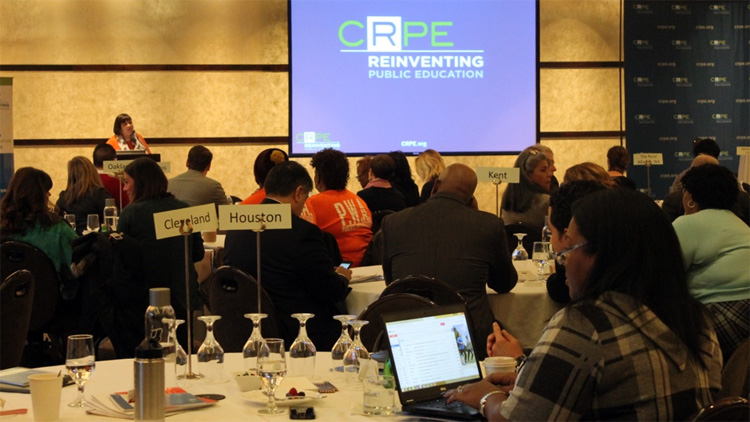Earlier this month, CRPE hosted its 14th Portfolio Network meeting in Philadelphia. We brought together nearly 150 community, district, and charter leaders from 23 cities. These are all leaders who are working across sector lines to focus on great education for all kids in the city.
For me, this year’s meeting seemed all the more urgent. These are unstable times marked by national political turmoil, polarizing debate about the future of school choice. At CRPE, we’re doing a lot of thinking about what this means for us as an organization and for the bold, evidence-based impact we’re trying to achieve.
A few weeks ago I was immersed in debate and thinking about how to achieve a “great society” as part of my Pahara Education Fellowship. As we debated the tensions and tradeoffs between values like liberty and equality, community and efficiency, and the challenge of accommodating pluralistic interests in leadership and governance, I kept thinking that the real progress on these fronts, in education at least, is happening in the cities we convene through the Portfolio Network.
The portfolio strategy tries to harness the best ideas for creating ownership at the school level, parent choice, community engagement, and government oversight with one end in mind: quality public education for every student. But as our network meetings always make crystal clear, this work is incredibly hard. The leaders who try to forge a path toward true portfolio systems must get used to being disliked or even hated by interest groups. Leaders constantly try to balance the need to act when schools fail or promising new school models emerge with the need to listen to and bring along the community.
Beyond the politics, portfolio leaders are also forced to make tough tradeoffs. Planning, coordination, and regulation for equity come at a cost to schools’ freedom to innovate and focus. Cities like DC, Denver, and New Orleans have taken steps to address inefficient enrollment, transportation, expulsion, special education, and accountability issues. They also respect school autonomy and want to ensure that parents have real choices among a variety of schools. But there is always some degree of zero sum, and there is no perfect tradeoff.
As many great thinkers have argued, true collective action means forgoing some rights for the communal benefit of all.
The very difficult reality in portfolio systems, however, is that there is no perfect balance among the interests of teachers, parents, school leaders, children, neighbors, and community groups. Cities are trying different approaches based on their local needs. The best portfolio leaders, whether parent activists, charter school leaders, authorizers, or district officials, commit to keep working together and refining until they make their city school system the best it can be. They understand that any new solution creates unintended consequences and can never make everyone happy.
As Winston Churchill once quipped, democracy is the worst form of government except for all the others that have been tried. The same is surely true of portfolio systems. The best portfolio leaders are those who are comfortable with making tradeoffs and love working with unusual partners to keep refining and optimizing for student success.
The challenge, though, is maintaining urgency during this long, hard work. Like it or not, individualized learning for students and professional agency at the school level are fast becoming the normal expectation in public education. Yet unmanaged school choice at scale can cause real pain and inequity. Parents can struggle to make sense of their options, find transportation, and access services. Districts can struggle to adjust to enrollment loss. All of us who believe that parents have a right to choose the best school for their child have a responsibility to dig in and help figure out these difficult issues.
The promise of portfolio has also never been more evident. Cities that free educators to do their best work, give parents meaningful options, put strong supports in place, and enforce thoughtful accountability have been more able than others to improve their lowest-performing schools, to embrace and spread innovative practices, and to create fair conditions for family choice.
At its heart, the portfolio strategy is a recognition that—in any great society—with liberty comes responsibility. To their credit, a growing number of cities recognize that reality. The challenge before us in this time of national instability is to ratchet up the speed and intensity of the things that we know work.





